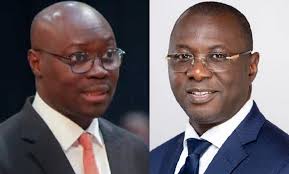The agreement, if approved by the IMF Executive Board, will enable Ghana to access approximately US$370 million in additional support. It marks the conclusion of the fourth review under Ghana’s three-year ECF programme, aimed at restoring macroeconomic stability.
While acknowledging progress in certain areas, the IMF raised concerns about a significant deterioration in programme performance toward the end of 2024. The Fund cited fiscal slippages ahead of the general elections, a large accumulation of payables, inflation surpassing targets, and delays in critical reforms.
The Minority says these observations validate its earlier claims that the government deliberately altered economic data to mislead the public and create the impression that the current administration inherited a severely distressed economy.The Minority in Parliament has accused the government of manipulating fiscal data for political gain, following the announcement of a staff-level agreement between the International Monetary Fund (IMF) and the Government of Ghana under the Extended Credit Facility (ECF) programme.
In March, following the presentation of the 2025 Budget, Ranking Member on the Finance Committee and former Finance Minister, Dr. Mohammed Amin Adam, accused Finance Minister Dr. Cassiel Ato Forson of misrepresenting the state of the economy for political purposes.
In a statement issued on Tuesday, April 15, Dr. Adam reiterated these concerns, pointing to inconsistencies between government-reported data and IMF findings.
“Whilst the Minister for Finance in the 2025 Budget announced the primary fiscal deficit on commitment basis (the fiscal anchor of the IMF programme) to be 3.9% of GDP, the IMF found it to be 3.25%, a difference of about 0.7% of GDP,” he stated.
Dr. Adam also criticised the IMF for deviating from its own definitions of fiscal performance, as originally outlined in the programme’s Technical Memorandum of Understanding.
“The IMF itself departed from their own definition of the primary fiscal balance as defined in the Technical Memorandum of Understanding reached at the beginning of the program,” he noted.
“By allowing multi-year payables to feature in the determination of the primary fiscal balance as if they occurred in 2024, the Fund Ghana Mission has effectively assessed the fiscal balance on metrics that vary from all the previous reviews conducted on programme implementation.”
Despite the concerns, Dr. Adam expressed hope that the IMF Executive Board would ensure a fair review of Ghana’s fiscal performance and uphold transparency in the country’s economic reporting.
“We are confident that the Executive Board of IMF will review the fiscal performance with integrity and ensure that our economy is devoid of data manipulation to restore confidence in the fiscal data of the country,” he said.





















